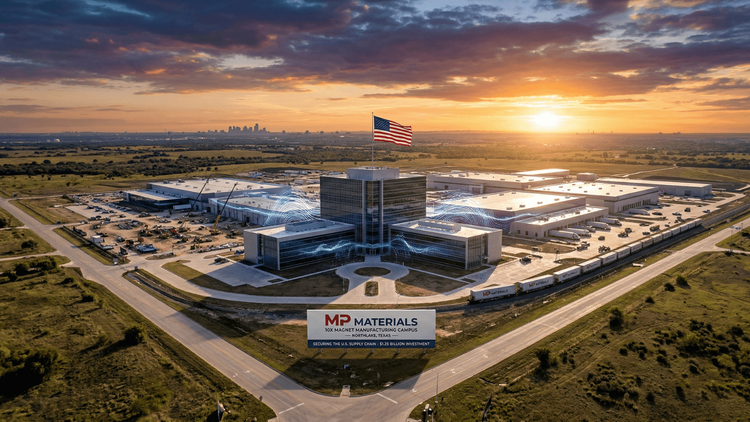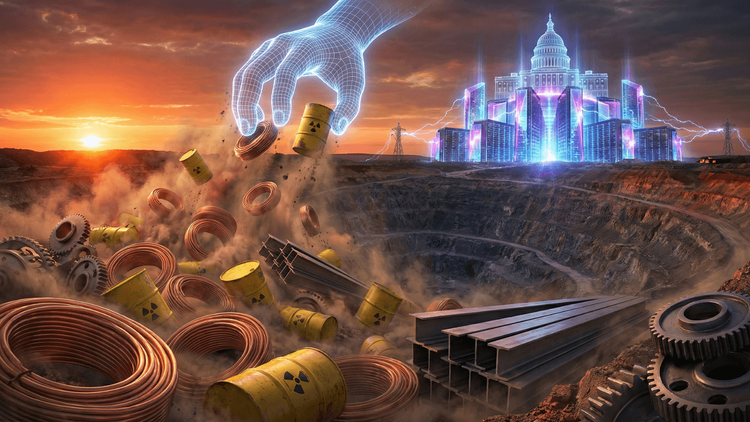Canadian CEOs on the Frontline of the AI-Driven Energy Demand
Canadian Energy Leaders Eye AI-Driven Electricity Boom Amid Rising Demand

Artificial intelligence (AI) is transforming industries at a breakneck pace, and with this technological surge comes an unprecedented demand for electricity. Canadian CEOs from leading energy companies like Enbridge and Cameco are now eyeing this AI-driven electricity boom as a golden opportunity. With warnings from prominent figures such as Tesla's Elon Musk and Amazon's Andy Jassy, the Canadian energy sector is gearing up to meet the escalating power needs of AI and data centres.
Warnings from Industry Leaders
Elon Musk, the CEO of Tesla, has been vocal about the impending challenges in the energy sector. At the Bosch ConnectedWorld event in Berlin, Musk predicted that while the semiconductor chip shortage may be resolved, the world is on the brink of an electricity supply crunch. “The next shortage will be electricity,” he warned, highlighting the rapid expansion of AI and electric vehicles (EVs) as key drivers of this demand.
Amazon's CEO, Andy Jassy, emphasized the necessity of using renewable energy to meet the burgeoning electricity demands. Speaking at the World Economic Forum in Davos, Jassy underscored the dual challenge of increasing energy supply while maintaining environmental sustainability. “We’ve got to do it in a renewable way, in a carbon-neutral or zero way. It can’t be going back to coal,” he stated, reinforcing the need for green energy solutions.
Sam Altman, CEO of OpenAI, shares similar concerns. The exponential growth of AI applications necessitates a robust and sustainable energy infrastructure. Altman's insights into the energy demands of AI have resonated within the industry, prompting a reevaluation of current power generation and distribution strategies.
The Growing Demand for Electricity
According to the International Energy Agency (IEA), data centres could consume as much electricity as Japan by 2026, more than doubling their current demand. This surge is primarily driven by the increasing reliance on AI technologies and the digital infrastructure supporting them.
The rising demand poses a significant challenge for power grids, which are already under pressure from the growing adoption of electric and plug-in hybrid vehicles. Ensuring a stable and sufficient electricity supply will be crucial to sustaining the AI revolution.
Enbridge's Role in the Energy Sector
Enbridge's CEO, Greg Ebel, highlighted the importance of adapting to the increasing energy demands from data centres and generative AI. On a recent post-earnings conference call, Ebel referred to this demand as "the topic du jour," emphasizing the need for substantial power generation.
Ebel predicts that meeting these demands will require a blend of natural gas and renewable energy sources. Enbridge, known for transporting a significant portion of the U.S.'s natural gas, is also heavily invested in renewable energy projects, positioning itself as a key player in this evolving landscape.
Brookfield Renewable Partners and Microsoft Deal
Toronto-based Brookfield Renewable Partners recently announced a landmark deal with Microsoft, aiming to develop over 10.5 gigawatts of new renewable energy capacity across the U.S. and Europe. This agreement is nearly eight times larger than any previous corporate power purchase agreement.
The collaboration will focus on wind and solar energy, alongside other impactful carbon-free generation technologies. This initiative represents a significant step towards meeting the escalating energy needs of tech giants while adhering to environmental commitments.
The Financial Implications
According to BloombergNEF, the estimated cost of developing these renewable projects, if solely invested in U.S. solar farms, would exceed $11.5 billion. This substantial investment underscores the financial stakes involved in transitioning to cleaner energy sources.
RBC Capital Markets analyst Nelson Ng noted that Brookfield's management foresees a sustained high demand for clean power, outstripping the availability of projects for years to come. This dynamic is expected to drive continuous growth and investment in the renewable energy sector.
Vancouver's Ballard Power Systems
Ballard Power Systems, based in Vancouver, is renowned for its hydrogen fuel cell technology, primarily used in buses, trucks, and trains. However, CEO Randy MacEwen envisions a broader application for stationary power segments, particularly in meeting the energy demands of data centres.
Ballard recently announced plans to establish a fuel cell "gigafactory" in Texas, supported by U.S. federal tax credits. This facility aims to address the significant energy needs of data centres, which are concentrated in the U.S., home to roughly one-third of the world's data centres.
Challenges and Opportunities in Green Energy
MacEwen highlighted the primary challenge for data centre operators: securing access to green energy. As data centres expand, ensuring a consistent and sustainable energy supply becomes increasingly critical.
Ballard's strategy involves positioning itself to capitalize on this market by 2025 and 2026, anticipating significant developments in green energy technology and infrastructure.
Cameco and Nuclear Power
Cameco's CEO, Tim Gitzel, regards nuclear power as a "clear winner" in the quest to meet the energy demands of an AI-driven future. During an April 30 conference call, Gitzel highlighted the tenfold increase in power requirements for AI applications, such as generative AI used in search engines.
Gitzel argued that clean and secure electrons from nuclear power are essential for supporting AI development, placing Cameco at the forefront of the digital revolution and strategic deindustrialization.
Future Outlook for the Energy Sector
The AI revolution is expected to drive continuous growth in energy consumption, necessitating innovative solutions and substantial investments in both renewable and nuclear energy.
As the world moves towards a more AI-centric future, the strategic importance of renewable and nuclear energy cannot be overstated. Companies like Enbridge, Brookfield, Ballard, and Cameco are poised to play pivotal roles in this transformative era.
Conclusion
In summary, the AI-driven electricity boom presents both challenges and opportunities for the energy sector. Industry leaders like Elon Musk and Andy Jassy have highlighted the urgent need for sustainable energy solutions. Canadian companies such as Enbridge, Brookfield Renewable Partners, Ballard Power Systems, and Cameco are stepping up to meet this demand with innovative strategies and substantial investments. As AI continues to reshape our world, the collaboration between technology and energy sectors will be crucial in ensuring a sustainable and electrified future.






